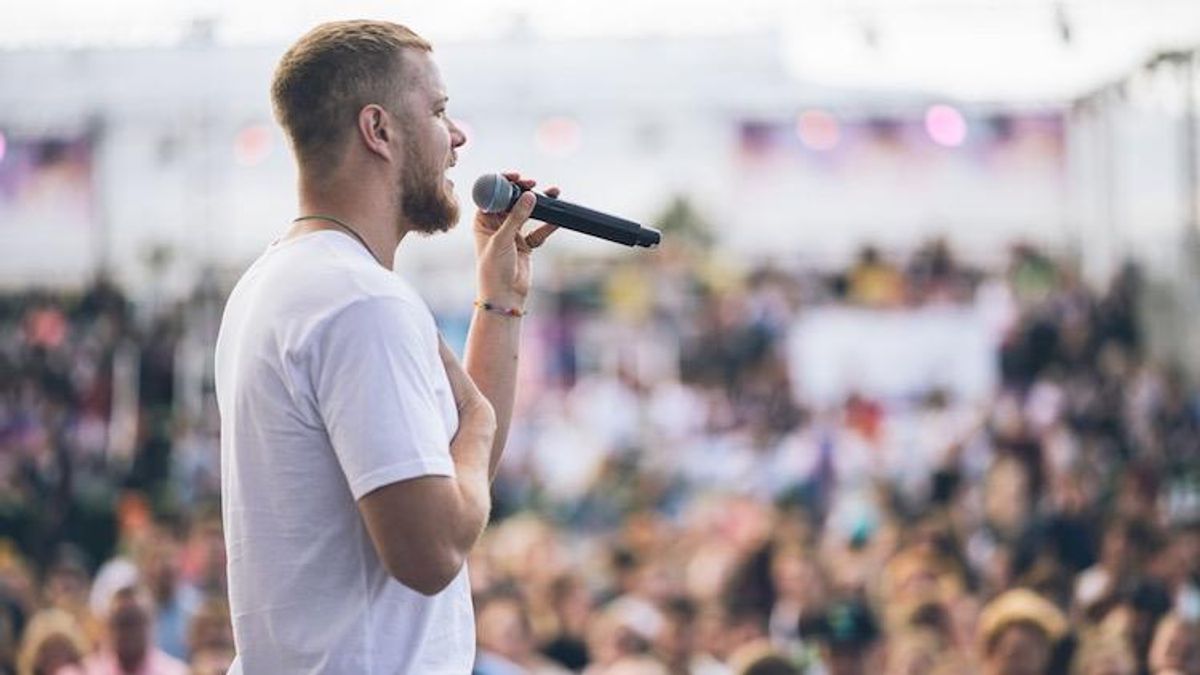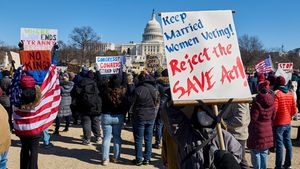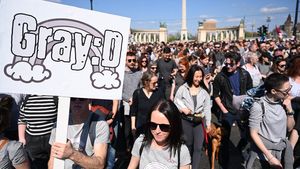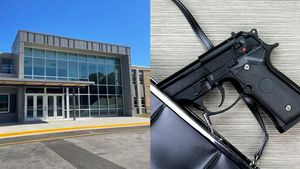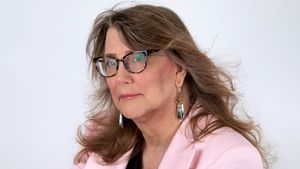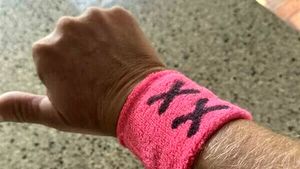In the past 20 or so years, suicide rates among teenagers in Utah have tripled, making killing oneself the number one cause of death for youths in the state. This is, undeniably, in large part due to Orthodox religions' rejection of homosexuality, leading many closeted teenagers of Orthodox faith to feel there is literally nowhere else to turn but death.
Enter Dan Reynolds, the frontman of Grammy-winning rock band Imagine Dragons, and arguably the most famous living Mormon on the planet. This Saturday will mark the premiere of his new documentary, Believer, at Sundance Film Festival.
Believer, directed by Don Argott, follows Reynolds on a journey to explore how the Mormon church treats its LGBTQ members, specifically those in their youth, and how harmful the church's teachings are toward those trying to reconcile their faith with their sexuality. The film looks at Reynolds' past year, in which he organized the LoveLoud Music Festival in Orem, Utah in support of the LGBTQ community.
"I'm Mormon, and I'm putting my arms out around all my Mormon brothers and sisters and saying, 'Hey, guys, we can do better. We have to do better,'" Reynolds told us in our exclusive interview.
The film, which will come to HBO this summer, also features footage of ex-Mormon and gay Neon Trees frontman Tyler Glenn, and includes two new songs from Reynolds and a score from Hans Zimmer.
Read our interview with Reynolds about his experience in the Mormon church, why he needed to make this documentary, and how the Mormon teachings impact LGBTQ youth, below.
OUT: Without spoiling anything, what's your story with growing up Mormon?
Reynolds: Family is at the forefront of Mormonism--I have a really large family, 8 boys, one girl. Very conservative upbringing. I was probably the most rebellious child growing up. In high school I had to hide my relationship with my Catholic girlfriend, because my parents didn't want me to have a serious girlfriend and wanted me to date Mormons. But I hid that from them for four years, and applied to BYU, and got accepted, and right before I was supposed to go, I had to sit down and speak with the bishop, and I told him I had had sex with my girlfriend.
So I got kicked out of BYU, a week before I was supposed to attend. Which was a really, super isolating experience for me. Because my whole community was Mormon, and all my friends were Mormon, and they all found out I was a sinful individual who could no longer attend the college I'd planned on going to. So I stayed home with my parents, and had to finish the Repentance process. It was a devastating experience for a 19-year-old who'd been ready to go away and start the next chapter of his life. I met with the Bishop of every week, and had to stay to task with the spiritual side of things, then applied to BYU after a year had passed and they said I was clean, went to BYU, and then went on a Mormon mission for two years.
What exactly does a mission entail?
It was in Nebraska--you don't get to pick where you go. It's super strict for two years--you wake up every day at 6 AM, study the scriptures for two hours, never leave the eyesight of your companion. You get to call home twice a year, on Mother's Day and Christmas, otherwise your interactions are just limited to a weekly letter home. Or email. You don't get to have girlfriends or boyfriends, you just knock on people's doors and tell them about Mormonism, and then do service work. I really enjoyed the service aspect of it--I was trying to find myself, I was feeling lost in my faith. I got to meet a lot of interesting people and hear their stories, help people get off of hard drugs... you lose yourself in the service work.
So I got back home, and that's when I started to find myself--I found my footing, started a band... I had a few friends who were queer and Mormon going up, and I saw how impossibly hard their life was, and the mental gymnastics they had to go through, and how devastating it was for them. They dealt with depression and anxiety on a level that was way heavier than what I'd dealt with. A lot of them hid their sexuality until they got much older, because there wasn't a space to come out to their families.
What is the Mormon stance on homosexuality exactly?
So what they say now is there is nothing wrong with being gay, it's just if you act upon it in any way. It's mental gymnastics. They expect gay people to be celibate for their whole life, or enter a mixed orientation marriage, which we know is extremely dangerous and leads to suicide and depression and anxiety. Multiple studies have shown how dangerous it is.
Mixed orientation--you mean gay and straight people getting married?
Yeah, marrying outside of your orientation. A gay man marrying a woman. They have a website called MormonGay, that shows stories of gay men marrying women and how they make that work. And stories of a young teenage girl, who is queer, who says, 'I've now given up on that and I focus on sports, instead of love.' It's devastating and super harmful. So my goal is to show the reality of that, to show what these youth are dealing with, who want desperately to retain their faith. A lot of people who weren't raised Mormon, who would view this from the outside, would say, 'Oh, it's easy. Just tell the queer youths to get out of the Mormon church.' But that's actually a really dangerous thing to be telling these youths, because basically you're telling them to leave their family unit. In a lot of cases they'd be kicked out of their home, which is far more dangerous. It's not as simple as that. Even if they don't have the faith, if they don't believe in Mormonism, it's far more complex and nuanced than that. Studies have shown that a child not accepted in their home or community is 8 times more likely to commit suicide.
And what do you hope people take away from this documentary?
So my goal is to get the church, and other Orthodox religions, because it's not just Mormonism--and I still claim Mormonism as my faith, there's lots of parts of Mormonism that I love, and cherish-- and I believe change can only happen from within. There are a lot of Mormons desperate for this change, who want our youth to be accepted, and seen as clean, and worthy in God's eyes, and loved. This is all Orthodox religions, that teach this dangerous teaching. I desperately want to create a healthier environment for our youth. So that's what this music festival, LoveLoud, is about. It's a gay rights festival in Utah, which is a place that doesn't have anything like that. And when we did it the Mormon church endorsed it, which is unprecedented. They've never touched anything LGBT in any way. In their statement, they said "LoveLoud, which is an LGBT festival," which was the first time I'd heard them say LGBT--they usually say 'same-sex attraction.' Small steps.
Would the change you're hoping to make be in the scripture of the Mormon text, or would that stay the same?
The rad part about Mormonism is they claim modern-day revelation. If a prophet is alive today, God can appear to him in modern times. So a prophet can say, 'Hey, God appeared to me. You guys got it wrong, and it's ok to be gay. It's actually godly, and clean, and perfect, and acceptable.' The church has done this before. Mormons used to practice polygamy. Then the government began putting a lot of pressure on them, and said, 'Hey, we're not cool with this.' And then suddenly God appeared to a prophet at the time and said, 'Hey, no more polygamy.' Same thing happened with the priesthood. They used to only allow white men to be priests. Then, pressure began to be applied, and God revealed, 'Now black people can have the priesthood.' So this church is meant for change.
So this could really affect change, with the right pressure applied.
Yeah, and it has. I've received hundreds of letters, since the festival in Utah. A mother wrote me that her child came out to her after the festival, because he felt safe to do it. People have said that at their church, five people came out to their families after the Love Loud festival. It is creating change. It's just slow.
Right now, in the last, like, 20 years, the suicide rate in Utah has tripled. It's the number one reason for death among teenagers in Utah. It's devastating, and there's a serious problem. My goal is to shed a light on that, and there are people who've been doing this way before I ever came to this. People of Orthodox faith who have been fighting this fight. But the Mormon church knows me because I'm maybe the most famous Mormon person in the world, behind Donnie and Marie Osmond. I've actually just been told that the head of Mormon Public Affairs is coming to the premiere, and I'm quite nervous about that because it shows the harsh reality of the church. Youths aren't happy, there are high reports of anxiety, and the suicide rate is just devastating, and a lot of it has to do with the church going to war on the LGBT community when Prop 8 went down.
This fight is super important and relevant right now. I'm Mormon, and I'm putting my arms out around all my Mormon brothers and sisters and saying, 'Hey, guys, we can do better. We have to do better.'
How'd you get involved in the film--did the director approach you?
It's actually really weird how it came about. I wanted to create a documentary about Fremont Street, in Las Vegas, where I'm from. The people who live there. I went to a lot of different directors, and it just didn't feel right, I didn't really know what I was doing, I just knew I wanted to make a documentary capturing life in Vegas. And then I met with Don Argott, the director who made Believer, and we just connected on a deep level, and he said he needed to come stay with me for two weeks and understand: 'Why you? Why do you care? Who are you?' So in taking that journey, he sat down with hours of interviews, and got me to open up in ways I hadn't, and talk about my faith, and thing I hadn't talked about in years. And we got to the core of a lof anxiety in my life, much of which is centered around my faith. I've dealt with depression a lot, and it really started when I got kicked out of BYU. We followed that journey, of spiritual wounds, and it led to this. As I said, a lot of my friends growing up were gay--
Were any of them out?
One of my friends from middle school was gay and Mormon, and I knew it, and we all knew it, but he would not acknowledge it. He'd go to dances with girls, and his family was very Mormon. He told me his mom came into his room one morning when he was sixteen and said 'I had this nightmare that you were gay. I can't even believe it. It was terrible.' And he shared that with me, and how devastating it was for him to hear that. And that's the story a lot of queer youths face. It's akin to murder, to be gay. That's what it says in the Mormon teachings.
And Tyler Glenn, the lead singer of Neon Trees, who's openly gay, is in this?
Yeah, he and I went to our service mission in Nebraska together. And when he finally came out, he wanted to be a gay Mormon and make it work, and the church upped its stance against gay kids, and said they couldn't get baptized in the church and had to be denounced at the age of 18, and so that's when Tyler left the church. I watched the whole Mormon community give him a hard time because he put out an album criticizing the church. The documentary explains it better than I could. But basically the director pushed us to follow the journey and express things that have been hard to express, and this is a result.
Do the Mormon people--do you think a lot of them have different views from the church on gay people?
Yeah, I think the amount of Mormons who are actually bigots is tiny. But I think the amount of Mormons who are silent, or confused, or just think 'This doesn't affect me directly,' is massive. And thus is the problem. And that's what really got me here, because I was a silent voice. And I feel now a lot of guilt that for all these years I've just been a silent voice. Because I really am the face of the Mormon church in the music industry in a lot of ways. There are not many Mormons famous in any regard. So to be silent, I feel like I have been an activist for bigotry. And I feel now the need to change that and speak up and be an activist for change. Mormons are good people--they serve others around the world. I loved the service component of my mission.
